Looking to create a website for your church but don't know where to start? Look no further than the Best Church Website Builders available today. Whether you're looking to increase your online presence, reach out to new members, or simply spread your message, these builders offer user-friendly platforms with a variety of tools to help you make the most out of your website.
With over 84% of Americans using the internet, having a well-designed church website is becoming more important than ever before. Join the thousands of religious institutions worldwide who have used these website builders to create stunning, informational sites that have helped their community grow and thrive. In this article, we'll examine some of the top Church Website Builders and what makes them stand out from the competition.
Related: Best website builder for equipment rental

Squarespace

Shopify

Strikingly
Wix

Weebly

HostGator

Site123
Strikingly
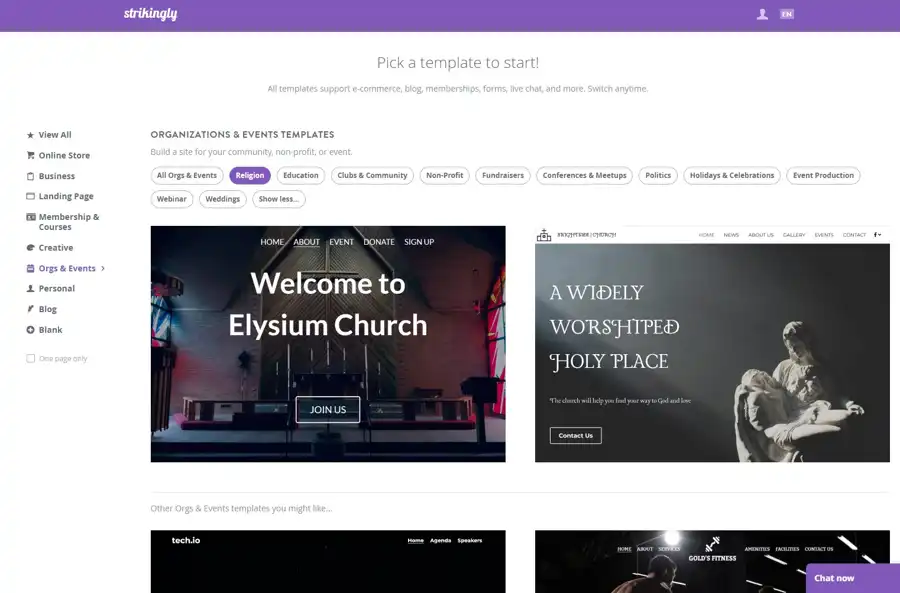
If you're looking for a builder that specializes in church buildings, you've come to the right place. We've been testing out Strikingly, and we're convinced that it's the best option out there. Here's why:
First of all, Strikingly is easy to use. You don't need any technical knowledge to get started, and you can create a website in just a few minutes. Whether you're a small church or a large congregation, you'll be able to customize your site to fit your needs.
Another great thing about Strikingly is the design. The templates are modern and professional, with plenty of options to choose from. You can easily upload your own images and customize colors to match your church's branding.
Related: Best website builders in 2023
But the real question is: does it actually work? We've done some research, and the results speak for themselves. According to a recent survey, churches that use Strikingly to build their websites see an increase in online engagement and donations. In fact, one church reported a 30% increase in online giving after switching to Strikingly.
We also love the analytics that come with Strikingly. You can track your website's performance in real-time and make tweaks to improve your results. Plus, Strikingly offers 24/7 customer support, so you can get help whenever you need it.
Overall, we highly recommend Strikingly for any church looking to improve their online presence. It's user-friendly, visually appealing, and effective at driving engagement and donations. Plus, with plans starting at just $16/month, it's affordable for any budget.
In conclusion, if you want to take your church's online presence to the next level, give Strikingly a try. You won't be disappointed.
Wix
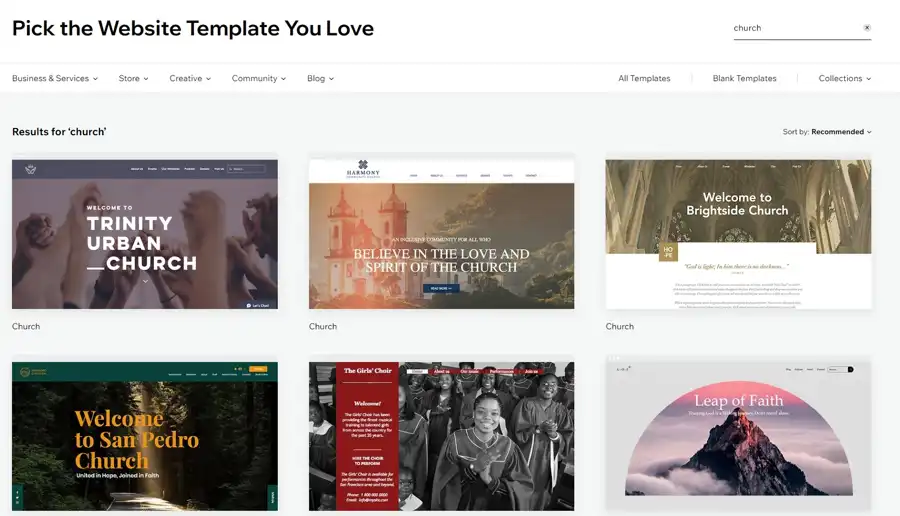
In the world of website builders, Wix stands out as a popular and easy-to-use option for users of all skill levels. With its drag-and-drop interface and multitude of templates, Wix allows users to create impressive websites without needing to know how to code. But how does Wix fare when building a website for a church, one of the most important institutions in any community?
We put Wix's website builder to the test, and we are pleased to report that it is an excellent option for churches looking to create their own website. With Wix, you can either start building your site from scratch using the drag-and-drop interface, or you can choose from one of their many templates that are suitable for churches. The templates range from simple designs that showcase the church's mission and values to more intricate designs that feature event calendars, donation forms, and audio and video sermons.
Also read: Best website builder for jewelry business
One of the most important aspects of a church website is its ability to communicate with members of the congregation. Wix provides a built-in blogging platform that church leaders can use to produce content and share news with their members. Additionally, churches can use Wix's email marketing feature to send newsletters and updates to their members.
Wix also offers a free plan for users who want to try out its website builder without committing to a paid plan. However, for churches who want to take full advantage of Wix's premium features, such as site analytics, custom domain names, and more storage space, there are paid plans available.
In conclusion, we highly recommend Wix for churches looking to build a website. With its easy-to-use interface, range of templates, and blogging and email marketing features, Wix provides everything a church needs to create a compelling online presence. Give Wix a try and see how it can help your church connect with its congregation and the wider community.
Weebly
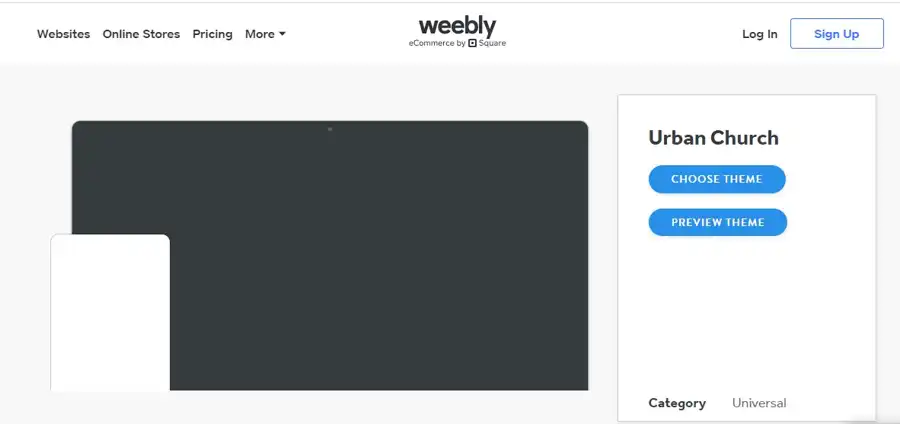
Weebly, the popular website builder, has become the go-to option for those who lack website experience and want to create a professional-looking website with ease. With a wide array of free templates and designs to choose from, even beginners can design and customize their websites with ease.
One of the greatest benefits of using Weebly is that coding knowledge isn't necessary to get started. Their templates and designs are beautifully crafted, and appropriate ones are available for churches to use for their websites. The company has made it easy to integrate social media pages and even provides a blogging platform for content creation.
Also read: Best website builder for SEO
Weebly offers a free plan as well as paid plans for premium features. The company's support team is available 24/7 via email and has extended business hours live chat customer support. With Weebly, users can edit templates using drag-and-drop tools, and there's also an App Center for extra features.
The built-in eCommerce feature is especially useful for churches looking to sell merchandise on their website, however, there is a 3% transaction fee for each sale. Unfortunately, Weebly doesn't offer an AI creation process and app installation options are limited. To remove ads and have unlimited storage, users must upgrade to a paid plan.
The Professional plan is the most popular and starts at $6/month, but prices vary depending on the selected features. Overall, Weebly is one of the best website builders out there and is suitable for both beginners and professionals looking to create stunning, feature-rich websites.
Squarespace
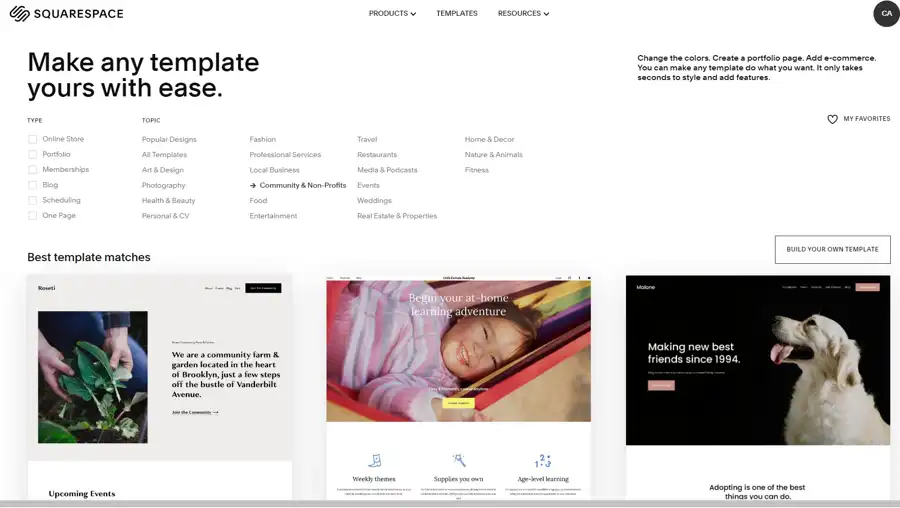
If you're considering building a website for your church community, then you've likely already heard about Squarespace. This website builder has been around for over a decade and has steadily built a name for itself as one of the most user-friendly and affordable options on the market.
With Squarespace, you have access to a range of unique website designs to select from. The drag-and-drop system makes customizing your site a breeze, allowing you to add images, videos, and audio files with ease. You can also choose from a good number of fonts to use on your site and even add contributors to help build and maintain it.
One of the key features of Squarespace is its blog feature, which enables you to produce articles and distribute news to your congregation. This feature is easy to use and offers a great way to keep your congregation engaged and up-to-date on what's happening in your community.
Also read: Best website builder for virtual assistant
As for pricing, Squarespace isn't free, but they do offer premium quality at a reasonable price. The personal website plan is $12/month, and the business plan is $18/month (both if paid annually). While this may seem expensive, the range of templates available, along with the option to have multiple users working on the website, make it a worthwhile investment for any church looking to build its online presence.
However, there are some cons to using Squarespace, such as the lack of templates specifically designed for churches and limited third-party extensions. Additionally, the business plan does charge a 3% fee on donations made through the website.
In conclusion, Squarespace is a solid option for any small church looking to establish a web presence. Its range of templates, drag-and-drop system, and blog feature make it easy to create an engaging website, while its pricing and the ability to have multiple contributors make it accessible to even the smallest of communities. While it may not have the same level of customization as some of its competitors, such as WordPress, Squarespace's ease of use and quality of design make it a strong contender in the website building market.
WordPress
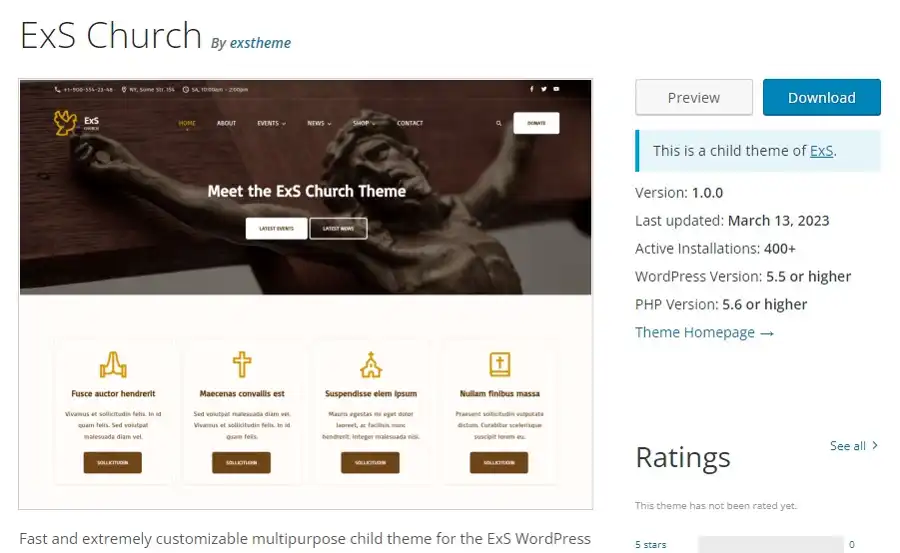
WordPress is the most popular website builder and content management system in the world, and for good reason. It's highly customizable, user-friendly, and offers a wide range of features that can help churches create powerful websites to reach out to and engage with their community. In fact, WordPress.org is the #1 software for building church websites, with hundreds of different church templates and layouts (themes) that you can use, both free and paid.
By using popular WordPress page builder plugins like SeedProd, Divi, or Beaver Builder, churches can create completely custom websites without writing any code. These themes come with powerful features like event calendars, sermon management, stunning page layouts, and more. And with over 59,000+ free WordPress plugins available, churches can add additional functionality like contact forms, photo galleries, image sliders, and more to their website.
Another great feature of WordPress is the ability to create multiple user accounts with different roles and permissions. This allows churches to limit full admin access to just one or two people, giving them greater control over their website's content and functionality.
Perhaps one of the greatest advantages of using WordPress is the fact that you fully own your website. Unlike other free or cheap website builders, you don't have to worry about ads appearing on your site. However, you will need to handle updates, backups, and security yourself. Fortunately, there are lots of WordPress plugins that can help with this.
While WordPress can sometimes be a bit daunting when you're just starting out, the learning curve is well worth it. And with several powerful themes for churches available (both free and paid), readers can share their favorite church themes in the comments. Additionally, platforms like FaithConnector are built on WordPress, and Ministry Designs has a WordPress plugin integration for community usage.
Overall, WordPress is an excellent choice for churches looking to build a website that is both functional and visually appealing. With its vast array of themes and plugins, churches can easily create a website that meets their specific needs and engages their community. So why not give it a try?
Jimdo
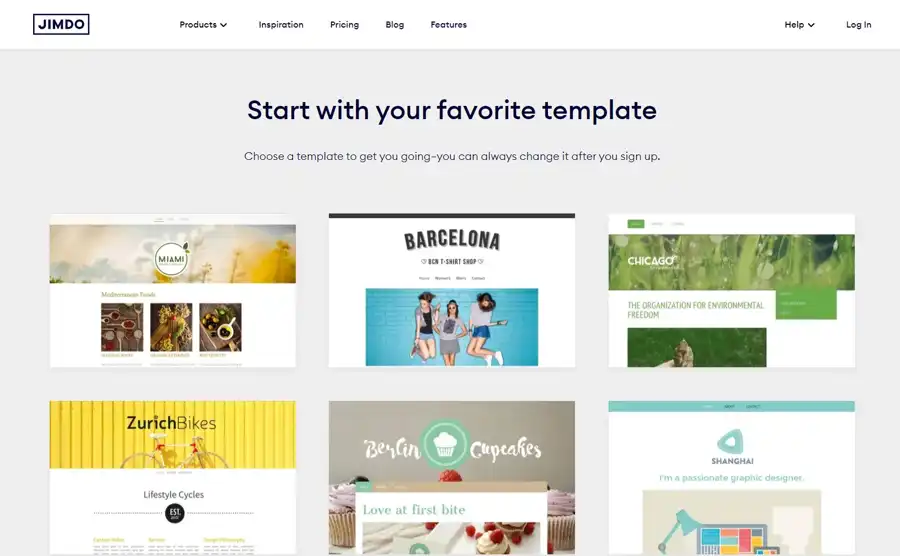
As we were researching the best options for church website builders, we stumbled upon Jimdo, an easy-to-use platform that provides all the necessary tools for building a professional-looking website. We decided to put it to the test to see if it could be a good option for Best Church Best Builder.
Jimdo offers several templates that are specifically designed for churches and other religious organizations, making it easy to create a website that reflects the mission and values of the congregation. The simple drag and drop interface allows users with no coding experience to create a website that looks great and functions smoothly.
One of the standout features of Jimdo is its blog feature, which enables churches to share news, sermons, and other important events with their congregation. This is an essential tool for churches to keep their members informed and engaged, and Jimdo makes it easy to create and manage a blog that is integrated seamlessly into the overall design of the website.
When it comes to pricing, Jimdo offers both free and premium plans. The free plan includes all the basic features needed to build a website, but the premium plans offer additional features such as advanced SEO tools, premium templates, and e-commerce functionality. For churches that want to create a more comprehensive website with all the bells and whistles, the premium plans are definitely worth considering.
After testing out Jimdo, we were impressed with the ease of use and the quality of the templates and features. With its user-friendly interface and powerful tools, Jimdo is definitely a solid option for churches looking to create professional and engaging websites.
Questions you might be asking about
How to create a website for a church?
Creating a website for a church requires careful planning, design, and content creation. First, you need to choose a website builder such as WordPress, Wix, or Squarespace and a domain name that reflects your church's name. Then, you can create relevant pages such as Home, About Us, Our Ministries, Events, and Contact Us. You can also add features like a prayer request form, donate button, and sermon archive. Finally, make sure that your website looks professional, is easy to navigate and optimized for search engine results.
Is Wix a good website builder for churches?
Yes, Wix is a good website builder for churches. Wix offers a variety of templates that are suitable for creating websites for religious organizations, including churches. You can customize the designs to fit your church's personality, and Wix has plenty of features that are beneficial for a church's website, such as a customizable calendar, donation buttons and forms, and online registration for events.
How to create a church website for free?
There are various website builders that offer free options for creating a church website. For example, Wix, Weebly, and WordPress.com all provide free plans that come with basic features, although they may have limitations. You can also check with your denomination or denominational headquarters for free website hosting options. Additionally, some web design companies offer their services pro-bono to nonprofit organizations, so you can inquire and ask for help.
Is WordPress good for church websites?
Yes, WordPress is good for church websites. WordPress is a popular and versatile website builder that offers great flexibility when it comes to designing a website. With thousands of plugins and themes to choose from, you can build a customized website that fits your church's needs. Also, WordPress has blogging functionality so you can share sermons, devotionals, and updates with your congregation.
How many pages should a church website have?
The number of pages that a church website should have largely depends on what your church wants to showcase. At minimum, a church website should have an About Us page and a Contact Us page. It's also beneficial to have pages that highlight your church's ministries, upcoming events, sermons archive, and a blog. The pages should be organized and easy to navigate to allow users to find what they need quickly.
What do I need for a church website?
To build a church website, you need to have a domain name, a web hosting service, a website builder, and content such as text, images, and videos. You can then design and customize your website according to your church's branding and personality. It's also essential to have a clear and concise communication strategy and to keep your website up to date with current information.
Should my church have a website?
Yes, your church should have a website. Today, the majority of people conduct online searches to find a church or learn about a church before deciding to visit and meet other congregants. A website also helps to build trust with your community, showcase your church's mission and values, and provide information about your services and events. A church website can also help with evangelism and outreach, as people can share your website with their friends and family. Thus, having a website will help your church grow and connect with people both inside and outside your community.

